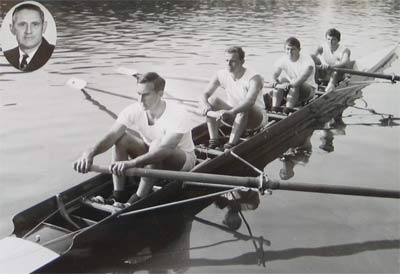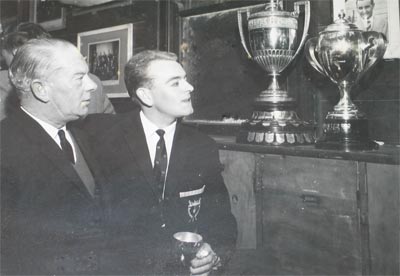History of Mercantile Rowing Club
Table of Contents
Chapters
- The River Yarra
- Early Rowing in Victoria
- The Beginnings (1880-1890)
- Mercantile in the Nineties (1890-1900)
- Sloan, Ivens and Fluctuating Fortunes (1900-1910)
- Dark Days and New Dawn (1910-1920)
- Years of Mixed Success (1920-1930)
- Through the Thirties (1930-1939)
- The Struggle for Survival (1939-1946)
- Building for Success (1946-1950)
- Mercantile to the Melbourne Olympics (1950-1956)
- Rowing to Rome (1956-1960)
- A Pink Cloud on the Horizon (1960-1965)
- The Storm and its Passing (1965-1966)
- A Clear Light Blue Sky (1966-1968)
- High Noon (1968-1970)
- A New Challenge (1970-1973)
- Fire and the Second Building Project (1973)
- Winds of Change (1973-1976)
- The Close of the Century (1976-1980)
- The Base for Success (1980-1984)
- Success (1984-1988)
- Oarsome Foursome (1988-1992)
- A Boathouse for the Best (1992-1996)
- The Rise of the Professional Coach (1996-2000)
- Golden Girls (2000-2005)
Appendices
13. A Pink Cloud on the Horizon (1960-1965)
Chapter Thirteen page 1 2
At the commencement of the 1962-3 season Simon Newcomb took over from Bill Wallace as captain. The season was well underway before the Commonwealth Games representatives returned from Perth. Norm Cairnes quickly brought the Senior Eight together and surprised the rowing world by defeating Banks in the State Title. Normally this would have led to his appointment as coach of the King's Cup crew, but the State selectors delayed the selection and as Banks proved too strong at two subsequent regattas, Cairnes declared himself unavailable. Derek Norwood and Martin Tomanovits were the only Mercantile oarsmen to be selected in Alan Jacobsen's King's Cup crew, with David Palfreyman as cox and Dick Garrard and Michael McKenna as emergencies.
In addition to Norm Cairnes' success with the Champion Senior Eight, Lloyd Williams coached the Champion Junior Eight, and Keith Bilney's lightweight eight was also successful in the championship. Bob Lachal and Dick Garrard won the Champion Junior Pair. Bob Aitken coached Scotch to win the Head of the River. Mercantile now provided coaches for six of the Public School first crews, which augured well for future recruitment. Brighton Grammar School was by now an established tenant of the club.
During this period Mercantile continued to support the Christmas and Easter regatta series with the oarsmen enjoying the camping and wineries of the district. A fine choir developed during the Easter series. The climax to the choral season came at 2 a.m. on one Easter Monday evening when the constabulary visited the Mildura camp-site to be greeted with a stirring rendition of "Silent Night". The choir retired to bed soon after.
The 1963-64 season started out on a high note but reached a disappointing climax. Hubert Frederico took over from Norm Cairnes as senior coach, and with David Boykett as stroke, Mercantile defeated Banks in all of the senior eight events for the season save for the one which mattered most, the State Championships, in which it was defeated by Banks by only two feet. Nevertheless, Jacobsen of Banks was appointed to coach the crew for the King's Cup, which was the test race for the Tokyo Olympic Games. Normally this would have led to Banks oarsmen taking the majority of the seats in the King's Cup crew, but such were the performances of the Mercantile eight during the season that four Mercantilians, Boykett, Lachal, McCall and Tomanovits, gained selection, and, after winning the King's Cup, went on to represent Australia at the Olympic Games at Tokyo. Three others from the Senior Eight went to Tokyo. Dick Garrard, Peter Gillon and Simon Newcomb, with lighweight oarsmen Tony Walker coached by Keith Bilney, scored a surprise win in the Coxless Four at the National Championship and won Australian selection. Unfortunately, neither the eight nor the four met with success at Tokyo.

1964 Olympic Four
Bow: Tony Walker, 2: Richard Garrard, 3: Simon Newcombe, Str: Peter Gillon, Cch: Keith Bilney
Junior and Maiden oarsmen competed with mixed success during the season, but the lightweights did better. The lightweight eight was successful at the second National Championship held at Canberra retaining the title it had won two years previously. The crew had only narrowly retained its State Title, winning by only three feet in a re-row after a dead heat with Richmond. And the Penrith Cup was regained for Victoria by a predominantly Mercantile crew, officially coached by Bill Wallace but in the last few days coached by Norm Cairnes.
The Australian Eight for Tokyo had experienced considerable difficulty with its equipment. The eight "King C. Gillette", designed and constructed by Sargent & Burton in Sydney specifically for the crew, proved entirely unsuited to the heavy and long-reaching crew. During the crew's pronounced pause forward, the stern would submerge. "King C. Gillette" was left at home. It was a good boat for a lighter crew and was subsequently used successfully by Newman College in the Intercollegiate Boat Race. A conventional Towns built craft was substituted for the Gillette, but in training at Tokyo it was found that due to inadequate bracing, the weight of the crew would cause its skin to flex inwards, seriously impeding the passage of the boat through the water.
Australian oarsmen were becoming increasingly dissatisfied with the stereotyped equipment produced by the three significant Australian boatbuilders - Sargent & Burton, and George Towns & Sons (both of Sydney), and Allan Sykes of Geelong.
Interest in modern overseas materials and design had originated at the 1956 Olympic Games, and had been kindled by Bob Aitken and David Boykett returning from Rome in 1960 with the Pocock oars. Shovel type oars became accepted following the club's purchase of a set of English Ayling blades in 1962. And now it was time for Mercantile to introduce a European boat.
Aitken and Boykett, while in Tokyo, arranged to purchase on behalf of the club a moulded ply Donoratico eight used by the Italian team. It arrived in Melbourne in December, 1964, aboard the freighter "Nanking". And what a furore it caused! There was intense controversy in the press. The Melbourne "Herald" asked whether it was fair for one club to have a boat 30 seconds faster than any other? Alan Mitchell, famous Wesley coach, demanded that such boats be banned from Public School competition.
In the first senior eight race of the season, Mercantile rowed in a conventional boat and defeated Banks narrowly. In the next race, using the Italian craft, the crew was soundly defeated! The craft proved unsuitable to the gale conditions prevailing on Lake Wendouree on the day of the Victorian Championship, with Banks winning by two lengths in the time of 9 minutes 38 seconds, an all time record for slowness. However, the boat, named "D. H. Boykett", had a generally successful racing life, and led to a quiet revolution in Australian boatbuilding materials, design and construction.
The international atmosphere at the club after Tokyo was enhanced by a visit to Melbourne by two American Olympians, gold medallist Emory Clark, and Geoff Piccard, and of Chris Leach, who had represented Canada at the Olympics. Leach stayed on and rowed in the Senior Eight throughout the season. Clark and Piccard trained and raced with the club for a few weeks before returning to the United States. These and similar visits have led to friendships and good relationships being formed by the club with overseas clubs and associations.
Simon Newcomb had retired as captain at the end of the previous season and Jeff Wylie, a successful lightweight oarsman, was elected in his place. Jeff Wylie entered into his duties with much ability and enthusiasm but tragedy struck when early in the season he was killed in a car accident. Club members were shocked when the news of the accident was received one Sunday morning. The club had lost a popular and successful oarsman and administrator. Michael McKenna, the vice-captain, took over as captain.

1964 Annual General Meeting
Jeff Wylie shows his father the Interstate Championship Trophies
By the end of the season, Mercantile had won both Junior and Lightweight premierships, and Champion Junior and Lightweight Eights. Henley Regatta was most successful for the club with wins in Senior, Junior and Lightweight Eights, and Junior and Lightweight Fours. Peter Downey and George Xouris won selection in the Victorian Lightweight Four. But the win by Banks in the Champion Eights in the gale at Ballarat had the result that for the fourth year in a row the Victorian crew was based on the Banks senior eight. Peter Gillon and Martin Tomanovits were the only Mercantile representatives to gain seats in the crew which was defeated by New South Wales in the race for the King's Cup.
